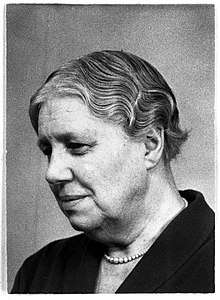Mary Esslemont
Mary Esslemont CBE FRCGP (3 July 1891 - 25 August 1984) was a general practitioner in Aberdeen, Scotland, Vice President of the British Medical Association (BMA) and president of the Soroptimist Federation.
Mary Esslemont CBE FRCGP | |
|---|---|
 Photograph of Mary Esslemont | |
| Born | 3 July 1891 |
| Died | 25 August 1984 (aged 93) Aberdeen, Scotland |
| Nationality | Scottish |
| Education | University of Aberdeen (1914, 1915, 1923) |
| Occupation | General practitioner |
| Medical career | |
| Field | general practice |
Early life and education
Mary Esslemont was born in Aberdeen in 1891. Her mother, Clementine Macdonald, was President of the Aberdeen Women's Liberal Association, and her father George Esslemont, was the Liberal MP for South Aberdeen.[1] She was educated at Aberdeen High School for Girls[2] and the University of Aberdeen, graduating with a BSc (1914) and an MA (1915). After completing her degrees, she lectured in science at Stockwell Training College, London (1917-1919) before returned to Aberdeen to complete her medical degree, MBChB (1923).[3] At university, she was the first woman President of the Students' Representative Association.[4]
Career
After university, she became an assistant medical officer in Keighley, Yorkshire (1924-1929). When she returned to Aberdeen in 1929 she became a general practitioner, practising for 30 years, and was appointed gynaecologist at the city's Free Dispensary. She was noted for her work with the city's poor and underprivileged and for her activism for women's rights.
Esslemont was the only woman to sit on the committee that negotiated on behalf of the British Medical Association with Aneurin Bevan on the development of National Health Service.[1] She was made a CBE in 1955, and a Fellow of the Royal College of General Practitioners in 1969. The following year the BMA made her a vice-president in recognition of her service.[1]
Apart from her medical work, Esslemont was involved in University life and sat on the University Court, the first woman to do so,[1] from 1947-1974.
Awards and honours
She was awarded an honorary LLD in 1954 and a student residence, Esslemont House, was named after her in 1976.[1] In 1981 she was awarded the Freedom of the city of Aberdeen.[1]
References
- "OBITUARY". British Medical Journal (Clinical research ed.). 289 (6446): 705–708. 1984-09-15. doi:10.1136/bmj.289.6446.705. ISSN 0267-0623. PMC 1443086.
- Fraser, W. Hamish; Lee, Clive Howard (2000). Aberdeen, 1800-2000: A New History. Dundurn. ISBN 9781862321083.
- Ewan, Elizabeth L.; Innes, Sue; Reynolds, Sian; Pipes, Rose (2006-03-08). The Biographical Dictionary of Scottish Women. Edinburgh University Press. ISBN 9780748626601.
- Fraser, W. Hamish; Lee, Clive Howard (2000). Aberdeen, 1800-2000: A New History. Dundurn. ISBN 9781862321083.